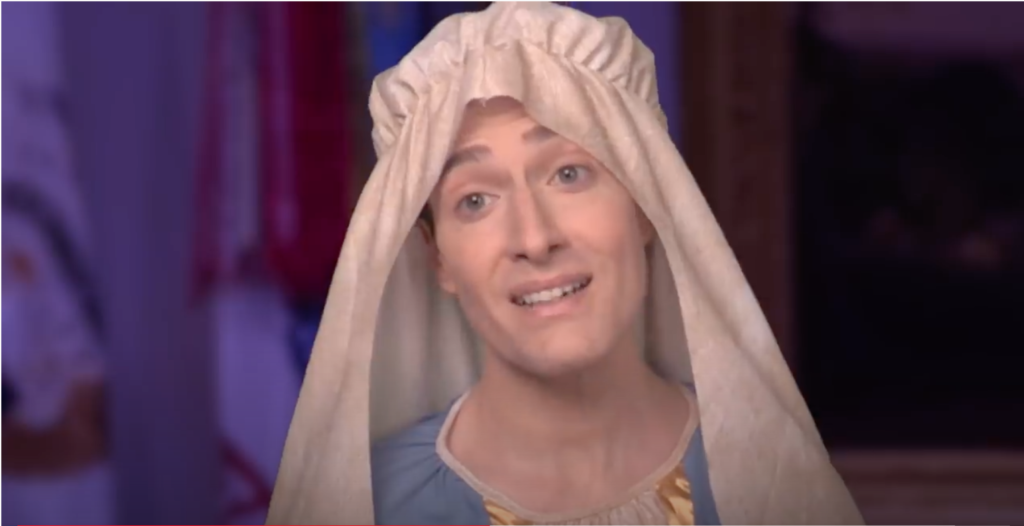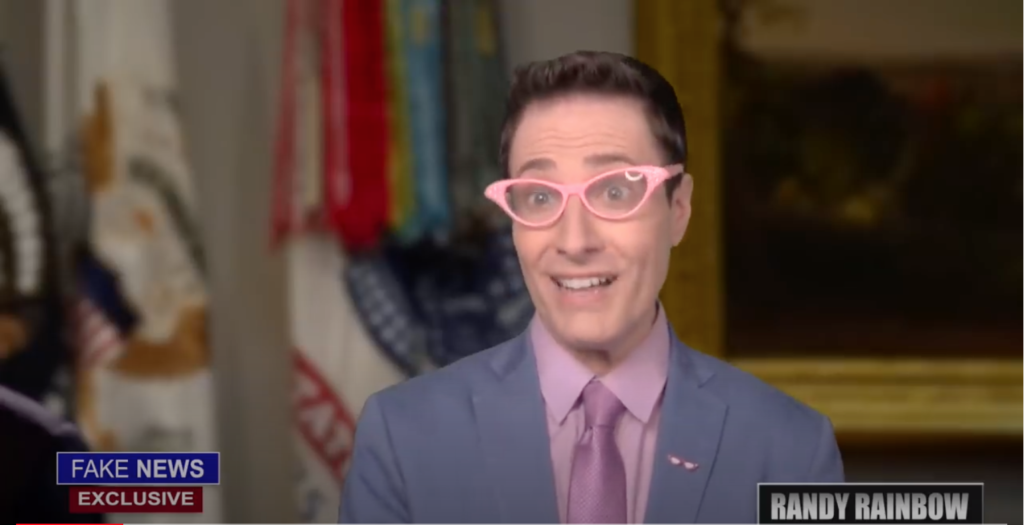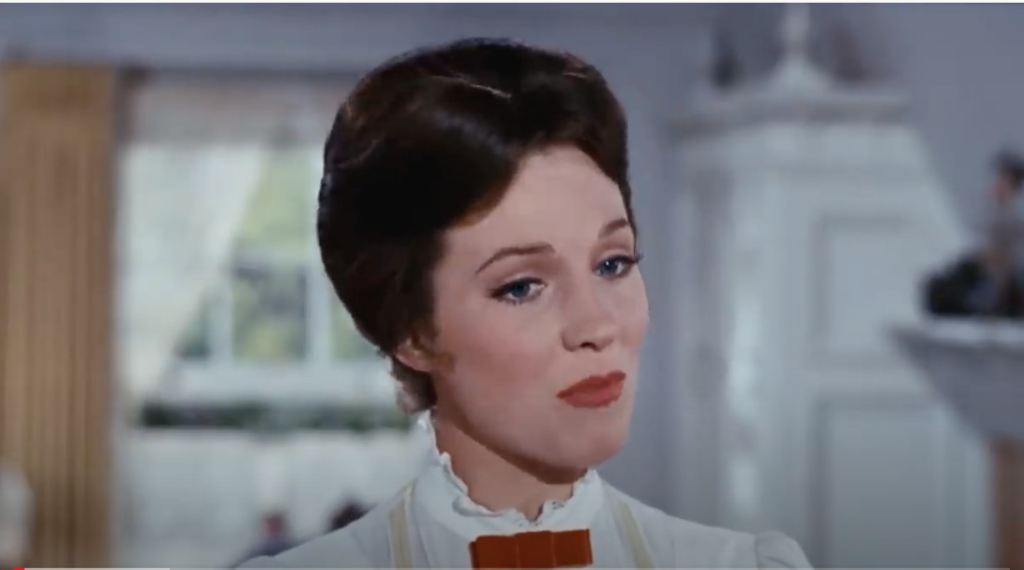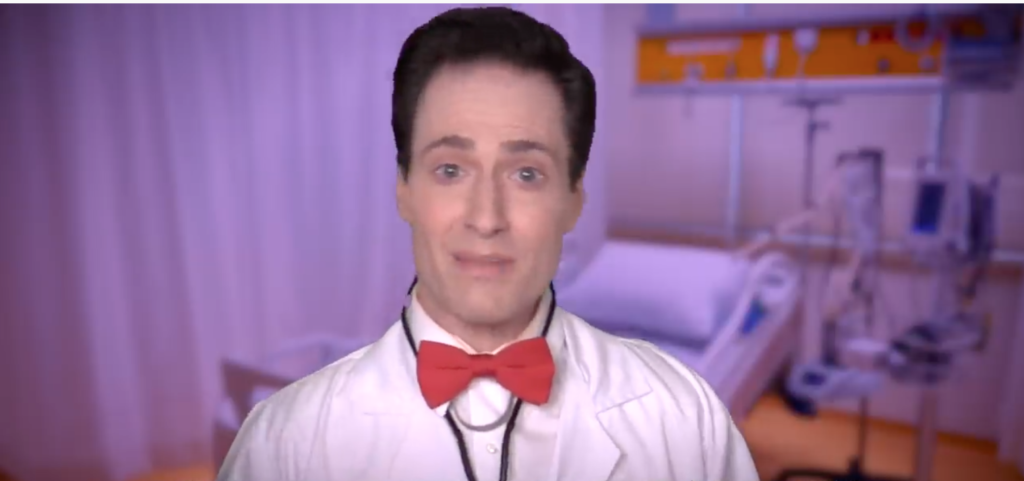August 17, 2020
In September 2019, I stood in a blocks-long line of excited fans in front of the Merriam Theater in Philadelphia. The attraction was neither the latest teen heartthrob nor a jazz luminary, but Randy Rainbow, the YouTube sensation whose timely parodies of show tunes and pop songs—their lyrics rewritten into comedic commentaries on current politics—regularly garner millions of views.
The crowd was diverse: while the majority was white and middle-aged, there were mothers and daughters, young and old, diverse gender identities, and people of color. All were united in their fandom of Rainbow. Their joy, clearly cathartic, was infectious. They cheered Rainbow through his greatest hits, from “Braggadocious” (from the first Clinton-Trump debate) to “Cheeto Christ, Stupid-Czar,” a takeoff on Jesus Christ Superstar (prompted by Trump’s calling himself the “King of Israel” and “the chosen one”). The audience even sang along—a bit surprising, as the show tunes he often parodies tend to appeal to an older demographic.
Indeed, Rainbow’s performance was a veritable review, via revue, of American politics over the past three years. The songs revived my memories of the many events since Trump first appeared on the political horizon as if they were yesterday, forming a time capsule that captured my contemporaneous feelings and providing a timeline of how the political environment had gotten to where we were. The performance made me wonder: beyond a shared dislike of Donald Trump, what do audiences find so broadly appealing in Rainbow’s songs? How do they spark laughter while calling attention to political issues?
This essay discusses the layers of parody and irony from which Rainbow draws. He often seeds his song with a quote or action by Trump or another politician, which he reframes to seem ridiculous. This quote is embedded into a song—a show tune or pop song, for which he has rewritten the lyrics. He often chooses songs with a comparable theme to the quote, drawing on humor while making deeper inferences. I will first discuss some elements of musical parody, as represented in Rainbow’s songs. I will further illustrate these points with a discussion of “Very Stable Genius” (2018, set to the tune of “I Am the Very Model of a Modern Major-General” from The Pirates of Penzance, W. S. Gilbert and Arthur Sullivan, 1879). This will be followed by a longer discussion of “A Spoonful of Clorox” (2020, set to the tune of “A Spoonful of Sugar” from Mary Poppins, Richard and Robert Sherman, 1964).
Aspects of Song Parodies
Rainbow’s technique of grafting new lyrics onto a pre-existing tune is a common approach to writing political songs, all the way from the Republican and Royalist broadsheets of 17th-century England to antinuclear protests in Japan, pro-democracy demonstrations in Hong Kong, and the events of the anti-Trump resistance in the past decade. As the writer need only change the lyrics, this method allows for the timely composition of new songs. A political song based on a pre-existing model can also increase its chances of engaging an audience that is familiar with that song.
Rainbow’s songs are made recognizable as parodies because he retains not only the melodies but also the sounds of words from the originals. In his first viral hit, “Braggadocious,” he set Trump’s nonexistent word from the first presidential debate with Hillary Clinton to the music of “Su·per·ca·li·fra·gil·is·tic·ex·pi·a·li·do·cious” from Mary Poppins. Rainbow matches not only the rhythm but also the syllables, consonants, and vowels (shown in bold) of the original song, especially on strong beats and at the beginnings and ends of phrases. Both Mary Poppins and Randy Rainbow start the first system on “super” and end on “docious,” and the relatively strong third beat of the first measure for both is “fragil(e)” (Fig. 2).
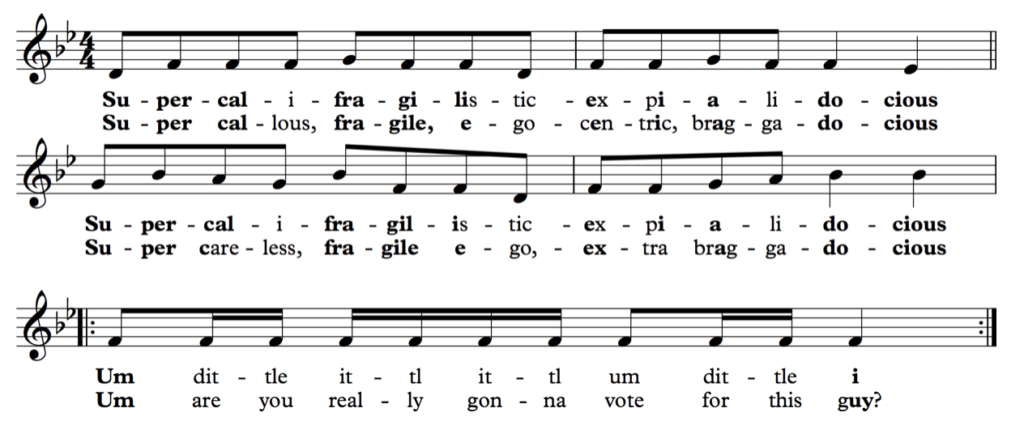
Like many parodists, Rainbow also matches the rhyme schemes and repeats phrases from the original songs. In “I’m a Very Stable Genius”—Rainbow’s parody of “I Am the Very Model of a Modern Major-General” by Gilbert and Sullivan—the verses are paired in couplets of three-syllable rhymes, as in the original (Fig. 3). (The words in common to the original and the parody are in bold; rhymes are in italics.)
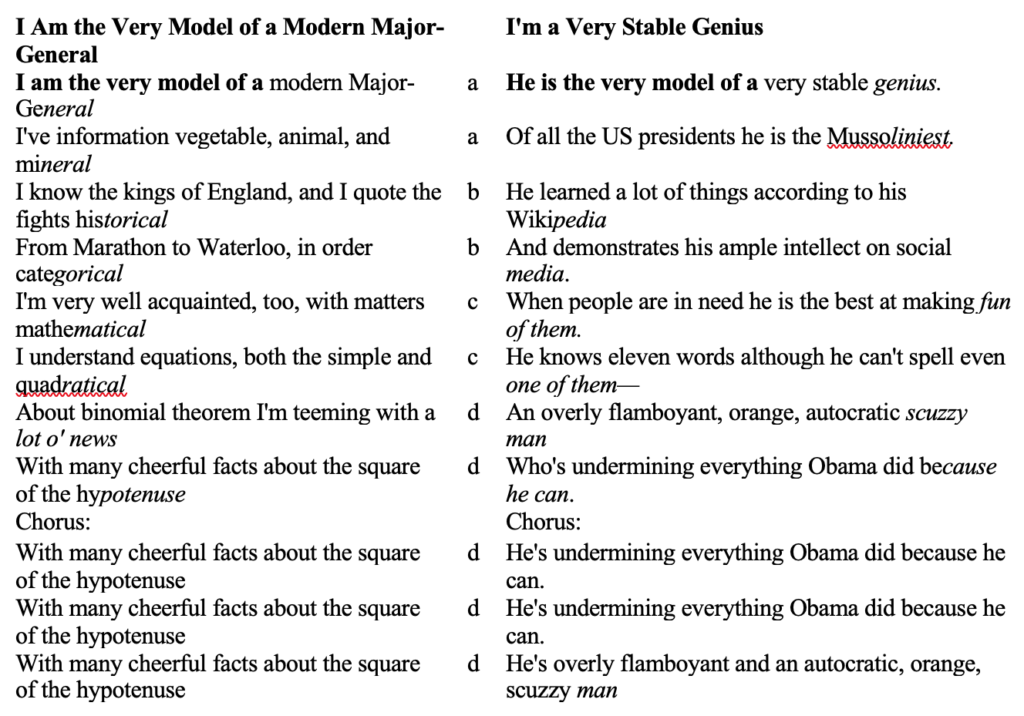
But Rainbow’s parodies also reference thematic aspects of the original songs. Linda Hutcheon defines parody as “a form of repetition with ironic critical distance, marking difference rather than similarity” (Hutcheon 2000, xii). In Rainbow’s case, this difference is often not only in the rewritten lyrics, but also in the reframing of a theme or character in the original song in a way that speaks to the political present.
In discussing the cognitive impact of political parodies, psychologists Francesca D’Errico and Isabella Poggi (2016) distinguish between “surface” parody and “deep” parody. A surface parody exaggerates the traits of a targeted object; a surface parody of a politician would exaggerate traits to make them look incompetent or silly. Rainbow’s “Braggadocious” is a surface parody that plays on Trump’s lack of vocabulary and tendency to use non-existing words, set to the tune of a giant, made-up word. Deep parody involves a recategorization: the parodist seeks to mock a target for a particular trait. First, the parodist finds a category (A) with that trait. Then, they find another category (B) to which the target doesn’t belong but shares that trait. Last, they recategorize the person in that category (B). The parody derives its humor from reframing one category for another, often an incongruous one: authority figures or elevated subjects are reclassified in a debased category, while subjects in lower socioeconomic strata are put in an elevated category.
“Very Stable Genius“
An example of a deep parody by Rainbow is “Very Stable Genius,” the aforementioned parody of “I Am the Very Model of a Modern Major General” from Gilbert and Sullivan’s Pirates of Penzance. The original song is among the most famous Gilbert-and-Sullivan patter songs, which feature fast-paced vocal delivery. The humor of patter songs generally comes from the incongruity of having an authority figure spitting out an incoherent list of items at an extraordinarily hurried pace. In the song, the Major General is a pompous man who brags about his own intelligence—he’s “teeming with a lot of news”—but who sounds like a fool regurgitating undigested, irrelevant information. Carolyn Williams (2011) argues that the Major General, outfitted in the pith helmet that the British wore in Africa and India, represented the incompetent bureaucrats who mismanaged colonies and national defense. Indeed, at the end of the song, the Major General admits that his military knowledge is out of date. Furthermore, his many young female wards were thought to be orphans, who, in Savoy comic opera of Victorian London, were signs of sexual impropriety and illegitimacy.
The parody is inspired by a quote that Trump first expressed on January 6, 2018, in reaction to Michael Wolff’s just-published book, Fire and Fury: Inside the Trump White House. Wolff depicts Trump as “irrational,” “volatile,” and full of “wide-ranging ignorance” (Wolff 2018, 158, 22). Reacting to reporters’ questions regarding his mental stability, Trump issued the following tweets:

The quote was immediately picked up by Twitter user @huntthesnark, who began a thread of rewritten lyrics to the Major General song; many others quickly chimed in with their own verses. The following day, a parody of the song, “I Am the Very Model of a Very Stable Genius,” by musician Chris Henson, appeared on YouTube.
Six months later on July 12, 2018, a reporter at a NATO press conference asked Trump if he would be tweeting something different once he had left; Trump assured him that he was a “very stable genius.” This incident is the seed for Rainbow’s song (see lyrics in Fig. 3).
Rainbow’s “Very Stable Genius” and the earlier parodies that riff on Gilbert and Sullivan’s Major General can all be analyzed as deep parody. They seek to mock Trump’s assertion that he is a “very stable genius” as self-aggrandizing boastfulness by pointing out his alleged ignorance, mismanagement of government affairs, and sexual impropriety (Fig. 4). These traits are shared by authority figures who sing patter songs, particularly the Major General. By recategorizing Trump as the Major General, these parodies mock Trump as the kind of incompetent and buffoonish authority represented by this theatrical character.
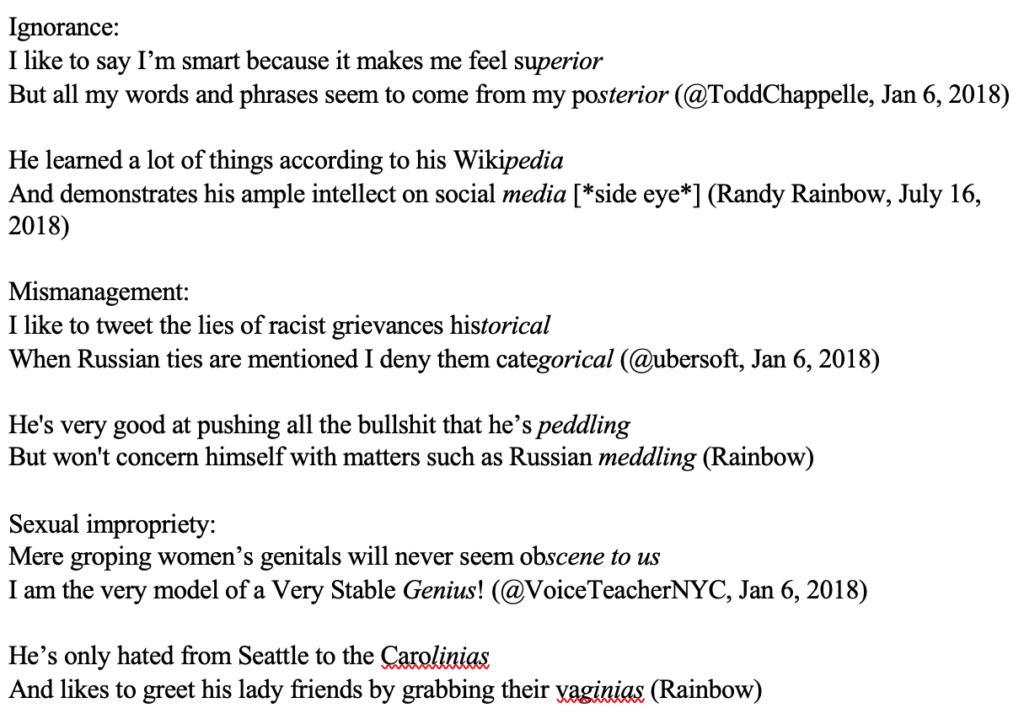
The music for both Sullivan’s original song and Rainbow’s parody consists of three verses in rounded binary form. This form gives rise to two punch lines in each verse. The first is at a cadence on the dominant preceding the digression (at the end of the fourth line of verse); Rainbow punctuates these endings with a comic pause, rolling his eyes to the side as he sings, “And demonstrates his ample intellect on social media.” A more emphatic pause follows at the eighth line of verse, which ends on a half cadence (a dominant chord) preceded by a melodramatic augmented sixth; the chorus then repeats this line three times on a dominant chord before the return to the first melody. With this schema, Rainbow highlights lines like “He’s undermining everything Obama did because he can,” as multiple replications of himself echo the words. Thus, by singing the melody of the Major General song, Rainbow recategorizes Trump, the self-proclaimed “very stable genius,” as a Major General—an outdated character of dubious competence who has bought his way into power.
“A Spoonful of Clorox”
Rainbow’s “A Spoonful of Clorox,” a parody of “A Spoonful of Sugar” from Mary Poppins, invokes an even more layered set of recategorizations. The seed for this parody is a quote from the administration’s coronavirus briefing on April 23, 2020. Turning toward Dr. Deborah Birx, Coronavirus Response Coordinator for the White House Coronavirus Task Force, Trump asked, “And then I see the disinfectant, where it knocks it out in a minute, one minute, and is there a way we can do something like that by injection?” This question—if disinfectant could be injected into human bodies—exposed an astonishing level of ignorance, in the eyes of many, regarding the distinction between human medicines and household cleaners, and the toxicity of the latter to humans. Jennifer Rubin wrote in the Washington Post that this question was just the latest “contribution … to the portfolio of misinformation, quackery and jaw-dropping ignorance he has shared with the American people during the coronavirus pandemic.” Dr. Birx visibly squirmed in her chair.
Rainbow’s parody draws several thematic parallels with the original. In the film, Mary Poppins, a nanny, is cajoling children to clean their room; in the parody, Randy Rainbow, the narrator, is echoing Trump’s words, to clean one’s body of the coronavirus through household disinfectants (Fig. 5). Hence, the source material and the parody share the theme of housecleaning, this time equated with cleansing the body. Rainbow spells out the recategorization of housecleaning as body-cleaning and disinfectants as medicine when he begins the introduction with a search for home remedies, but instead of referring to honey and lemon, he sings, “every product ‘neath your sink/ becomes a medicine to drink.”
As previously noted, Rainbow’s retention of sentence structures and key words from the original songs not only enhances the listener’s ability to recall the original songs, but also juxtaposes categories of ideas. When Mary Poppins sings,
That a
Spoonful of sugar helps the medicine go down
she is referring to the practice of giving children sugar to help them take their medicine, as a metaphor for finding fun in household chores to get them done. When Rainbow sings,
That a
Spoonful of Clorox makes your temperature go down
his line recalls not only the textual structure of Poppins’ line, but also its literal meaning. The mental juxtaposition of these two lines recategorizes “Clorox” as “medicine,” underlining the absurdity of Trump’s suggestion.
Rainbow underlines this absurd idea of cleaning one’s insides with disinfectants by naming no less than eight household cleaning brands: Pledge, Drano, Swiffer, Lysol, Windex, Resolve, Mister Clean, and of course, Clorox. In this world, the act of cleaning literally elides with medicine: “Slap your Mom with a Swiffer till her temperature goes down.” And Drano can unclog respiratory tracts just as well as sink drains: “A little Drano in your cup / Will clear your sinuses right up.”
Second, Mary Poppins offers a quick, magical fix to the problem of an untidy room: she snaps her fingers, and objects fall magically into place; the children then do the same. Rainbow begins the song with a wry imitation of the original (Fig. 6).

This imitation implies that Trump is seeking a quick, magical fix to the problem of coronavirus, as if he could solve it by snapping his fingers. He has repeatedly stated his belief in hydroxychloroquine, as if to will it to be a magical cure, despite evidence to the contrary—a point Rainbow makes by singing, “Since it’s improbable you’ll win / With your hydroxychloroquine / Splash some Windex in your wine and you’ll Resolve.” Rainbow further highlights Trump’s tendency to oversimplify medical issues and ignore the facts when he sings, “No need for tests / The President suggests… .” He saves his best punchline for the final verse, juxtaposing in rhyme two words that would normally be diametrically opposed—“There’s no vaccine, so try some Mr. Clean”—and underlining them in a cappella harmony followed by a vocal cadenza (echoing the cadenza that Mary Poppins’ reflection in the mirror takes).
This gesture to magic opens up a third theme—children and childlike behavior. Mary Poppins is a children’s film, and in “A Spoonful of Sugar,” Mary Poppins is instructing children on what to do. In his parody, Rainbow adopts an ironic Mary Poppins-like persona, who is addressing children, or childlike adults, on how to clean their homes—and bodies—of coronavirus. His act has some basis in reality: shortly after Trump first touted hydroxychloroquine as a cure for COVID, a couple in Arizona ingested a fish-pond product containing chloroquine phosphate; the husband died. Shortly after Trump talked about ingesting disinfectants, Maryland governor Larry Hogan reported that the state health department had received hundreds of calls from residents asking if they should ingest disinfectants. These incidents revealed how appealing such magical cures seemed to many Americans, regardless of how childlike and unrealistic such thinking was.
Rainbow’s “A Spoonful of Clorox” highlights the dangers of both disinfectants and Trump’s statements. An early shot in the video shows a small child picking up a jug of bleach; it reminds viewers that one normally keeps household cleaners out of children’s reach so they won’t harm themselves—i.e., only an unaware child would willingly ingest bleach. Rainbow shakes his head when announcing that it’s “the latest COVID craze [to drink Clorox].” He notes the consequences: “Spray your boyfriend with Lysol till he’s six feet underground.” At the end, he drinks detergent while the screen flashes, “Do not actually drink cleaning fluids,” feigns an adverse reaction, and falls down. Hence, the video contains both the ironic call to medicate with disinfectants—a literal interpretation of Trump’s query to Dr. Birx—and the literal warning not to do so.
***
Rainbow began his show in Philadelphia with a montage of videos, in which fans thanked him for “keeping them sane”; Barry Manilow sang his hit “Mandy” as “Randy,” noting, “I need you today.” Like Manilow’s tribute, Rainbow’s parodies are ear-catching in part because they are send-ups of recognizable songs; reusing their music enables him to churn out parodies in a timely fashion and have them catch on. But his choice of source songs also reveals a rich web of embedded meanings. He often takes a targeted idea that is shared between a song and a Trump quote, and remaps them onto incongruous categories, which adds to the humor. Trump’s quote about injecting disinfectants to cure COVID allows for the incongruous remapping, “cleaning products are medicine”—an idea that shares two themes, cleaning and medicine, with “A Spoonful of Sugar.” This cognitive process of identifying targeted ideas and parallels between categories helps listeners to understand what is at stake in the current political environment.
– Noriko Manabe
References Consulted
D’Errico, Francesca, and Isabella Poggi. 2016. “‘The Bitter Laughter.’ When Parody Is a Moral and Affective Priming in Political Persuasion.” Frontiers in Psychology 7. https://doi.org/10.3389/fpsyg.2016.01144.
Genette, Gérard. 1997. Palimpsests: Literature in the Second Degree. Translated by Channa Newman and Claude Doubinsky. Lincoln, NE: University of Nebraska Press.
Gibbs, Raymond W. 1994. The Poetics of Mind: Figurative Thought, Language, and Understanding. Cambridge, UK: Cambridge University Press.
Hutcheon, Linda. 2000. A Theory of Parody: The Teachings of Twentieth-Century Art Forms. Urbana, IL: University of Illinois Press.
Lacasse, Serge. 2000. “Intertextuality and Hypertextuality in Recorded Popular Music.” In The Musical Work: Reality or Invention?, 35–58. Liverpool: Liverpool University Press.
Williams, Carolyn. 2011. Gilbert and Sullivan: Gender, Genre, Parody. New York: Columbia University Press.
Wolff, Michael. 2018. Fire and Fury: Inside the Trump White House. New York: Henry Holt and Co.


